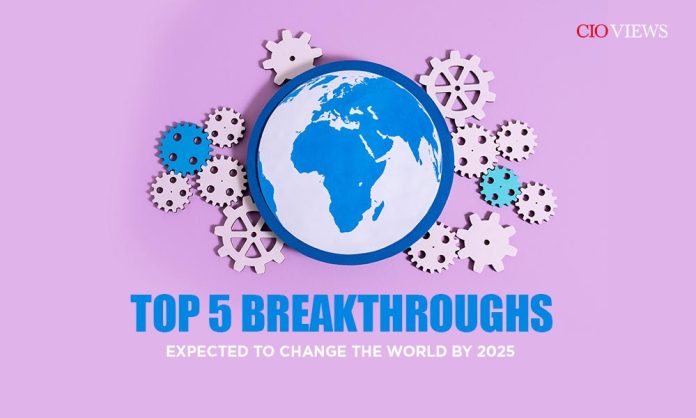The world is on the edge of unprecedented advances in technology that promise to reshape industries, societies, and even human potential itself. As we approach 2025, the pace of innovation has increased, fueled by breakthroughs that appear to blur the distinction between science fiction and reality. In this blog, we look at the top five breakthroughs expected to change the world by 2025. These developments, which are based on cutting-edge research and technological prowess, are more than just trends; they are transformative shifts that have a chance to redefine our future.
1. Artificial Intelligence (AI) Becoming Ubiquitous
- The Rise of General AI
- AI in Healthcare
- AI in Autonomous Systems
- Ethical Implications and Regulation
Artificial Intelligence (AI) has been at the forefront of technological discourse for years, but by 2025, its influence is expected to become ubiquitous. We are on the verge of witnessing the rise of General AI—systems capable of performing a wide range of tasks, much like human intelligence but at a far greater speed and efficiency. This transition from narrow AI (designed for specific tasks) to General AI is set to revolutionize industries from healthcare to finance.
In healthcare, AI’s predictive analytics could enable early diagnosis of diseases like cancer and Alzheimer’s, significantly improving survival rates. For instance, AI algorithms trained on vast datasets are already identifying patterns in medical imaging that human doctors might miss. By 2025, these systems could be deployed universally, making healthcare more proactive than reactive.
Autonomous systems, including self-driving cars and drones, will rely heavily on AI to navigate and make real-time decisions in complex environments. Companies like Tesla and Waymo are leading the charge, with fully autonomous vehicles expected to be commercially viable by 2025.
However, the rapid adoption of AI also raises ethical concerns. The potential for AI to be used in surveillance, bias in decision-making algorithms, and the impact on employment are significant issues that require careful regulation. As AI becomes more integrated into daily life, balancing innovation with ethical considerations will be crucial.
2. Quantum Computing: Revolutionizing Data Processing
- What is Quantum Computing?
- Applications in Cryptography
- Impact on Drug Discovery
- Challenges in Quantum Computing
Quantum computing is another breakthrough that is expected to make a significant impact by 2025. Unlike classical computers, which use bits to process information as either 0s or 1s, quantum computers use quantum bits (qubits) that can exist in multiple states simultaneously. This property, known as superposition, allows quantum computers to process complex computations at speeds unimaginable by today’s standards.
One of the most anticipated applications of quantum computing is in cryptography. Quantum computers have the potential to crack traditional encryption methods in seconds, which could revolutionize data security. Conversely, this capability also poses a threat to current security infrastructures, necessitating the development of quantum-resistant encryption methods.
In the pharmaceutical industry, quantum computing could accelerate drug discovery by simulating molecular interactions at an unprecedented scale. This could lead to the development of new treatments for diseases that are currently considered incurable.
Despite its promise, quantum computing faces significant challenges. The technology is still in its infancy, with issues related to error rates and qubit stability needing resolution. Moreover, the development of quantum algorithms is complex, requiring a new approach to programming and problem-solving.
3. The Next Frontier in Biotechnology: CRISPR and Gene Editing
- Understanding CRISPR Technology
- Applications in Medicine
- Ethical Dilemmas
- CRISPR Beyond Medicine
CRISPR (Clustered Regularly Interspaced Short Palindromic Repeats) technology is poised to become a cornerstone of biotechnology by 2025. This revolutionary gene-editing tool allows scientists to make precise modifications to DNA, offering the potential to cure genetic diseases, enhance crop resilience, and even combat climate change.
In medicine, CRISPR is being explored as a treatment for conditions like sickle cell anemia, cystic fibrosis, and certain types of cancer. Clinical trials are already underway, and by 2025, we could see CRISPR-based therapies become mainstream. For example, researchers are developing CRISPR techniques to target and eliminate HIV-infected cells, offering hope for a potential cure.
However, the power of gene editing comes with significant ethical concerns. The possibility of “designer babies” and the use of CRISPR for non-therapeutic enhancements raises questions about the societal implications of such technologies. Striking a balance between therapeutic use and ethical boundaries will be crucial as CRISPR technology advances.
Beyond medicine, CRISPR has applications in agriculture, where it can be used to engineer crops that are more resistant to pests and environmental stresses. This could play a vital role in addressing food security challenges as the global population continues to grow.
4. The Energy Revolution: Renewable Energy and Storage Innovations
- The Growth of Solar and Wind Power
- Advancements in Battery Technology
- The Role of Hydrogen
- The Decarbonization of Industry
The transition to renewable energy is not just a trend; it’s a necessary shift to mitigate climate change. By 2025, we can expect significant advancements in both renewable energy generation and storage solutions, which will be crucial in achieving a sustainable future.
Solar and wind power are expected to become the dominant sources of energy, driven by advancements in technology and decreasing costs. Solar panels are becoming more efficient, and innovations in wind turbine design are increasing energy capture. The integration of these renewable sources into national grids is set to accelerate, with countries aiming for net-zero emissions targets.
One of the important challenges of renewable energy is storage. However, battery technology is advancing rapidly, with companies like Tesla and Panasonic developing high-capacity, long-lasting batteries. These innovations will enable the storage of excess energy generated during peak production times, ensuring a stable energy supply even when the sun isn’t shining or the wind isn’t blowing.
Hydrogen is also emerging as a crucial component of the energy revolution. Green hydrogen, produced using renewable energy, could replace fossil fuels in industries that are hard to electrify, such as steel production and long-haul transportation.
The decarbonization of industries is another significant trend. By 2025, more companies are expected to adopt carbon capture and storage (CCS) technologies, reducing their carbon footprints and contributing to global climate goals.
5. The Metaverse: The Next Digital Frontier
- Defining the Metaverse
- Applications in Entertainment and Social Interaction
- Impact on the Workplace
- Challenges and Opportunities
The concept of the metaverse—a collective virtual shared space created by the convergence of virtually enhanced physical reality and physically persistent virtual reality—is expected to transform the way we interact with digital environments by 2025. The metaverse is not just a single virtual world but a network of interconnected digital spaces where users can socialize, work, shop, and play.
In entertainment, the metaverse promises to create immersive experiences that go beyond traditional gaming. Virtual concerts, art exhibitions, and sports events could become commonplace, allowing people to participate from anywhere in the world. Companies like Meta (formerly Facebook) and Epic Games are investing heavily in developing these virtual spaces, signaling the importance of the metaverse in the future of entertainment.
The workplace is also set to be transformed by the metaverse. Virtual offices could become the norm, enabling remote work with a level of interactivity that mimics physical presence. This shift could reduce the need for physical office spaces and change the dynamics of global business.
However, the development of the metaverse comes with its own set of challenges. Issues related to privacy, data security, and digital addiction need to be addressed. Moreover, the metaverse could exacerbate existing digital divides, as access to high-quality virtual experiences may be limited by socioeconomic factors.
Conclusion: A Future of Unprecedented Potential
The breakthroughs expected by 2025 are more than just technological advancements—they represent a fundamental shift in how we live, work, and interact with the world. From AI and quantum computing to CRISPR and renewable energy, these developments have the potential to solve some of the most pressing challenges of our time while raising new ethical and societal questions.
As we approach 2025, it is crucial for governments, businesses, and individuals to not only embrace these innovations but also engage in thoughtful discussions about their implications. The future is bright, but it is up to us to shape it responsibly, ensuring that these breakthroughs benefit all of humanity.





